Boyle J.A. The Cambridge History of Iran, Volume 5: The Saljuq and Mongol Periods
Подождите немного. Документ загружается.

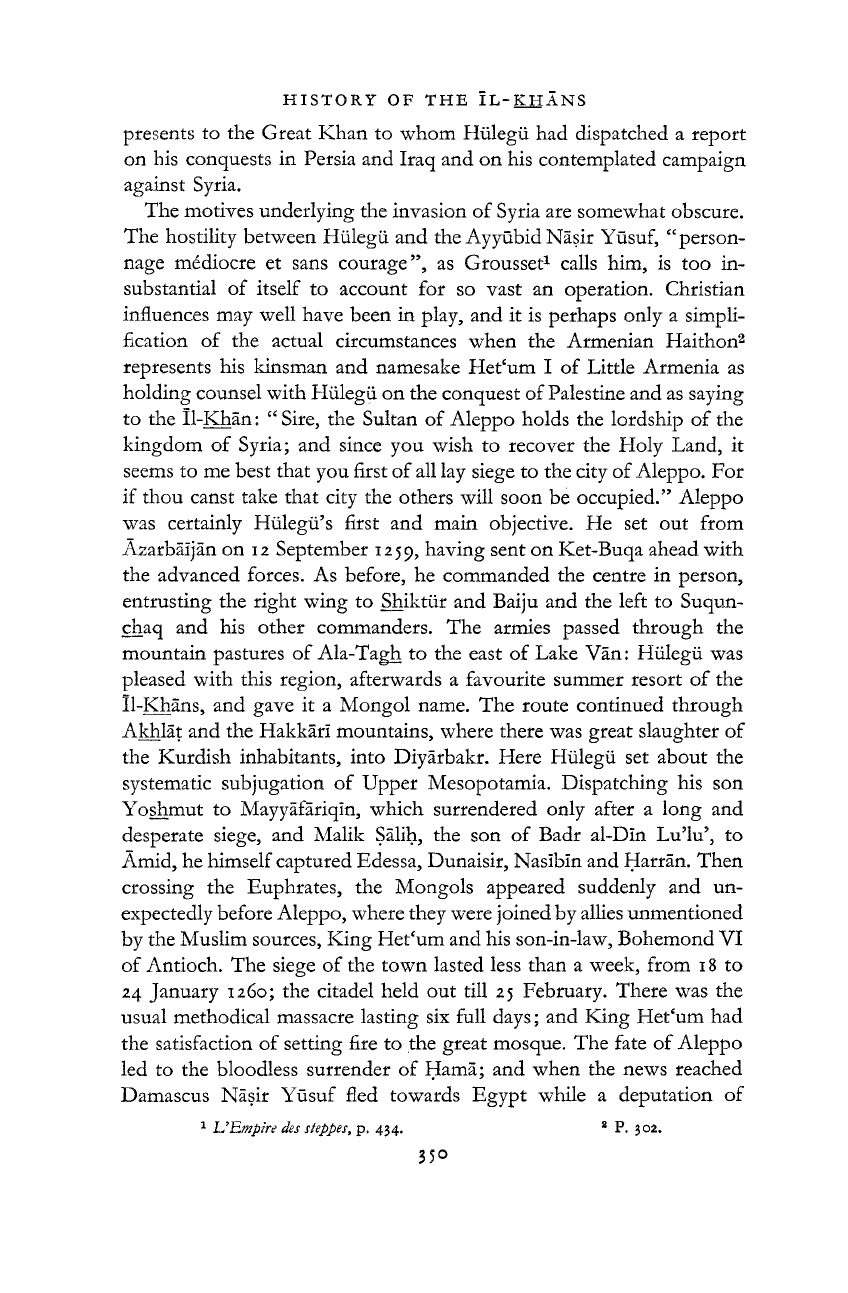
HISTORY OF THE î L - КIIÂ N S
presents to the Great Khan to whom Hulegii had dispatched a report
on his conquests in Persia and Iraq and on his contemplated campaign
against Syria.
The motives underlying the invasion of Syria are somewhat obscure.
The hostility between Hulegii and the Ayyübid Naşir
Yusuf,
"person-
nage médiocre et sans courage", as Grousset
1
calls him, is too in-
substantial of itself to account for so vast an operation. Christian
influences may well have been in play, and it is perhaps only a simpli-
fication of the actual circumstances when the Armenian Haithon
2
represents his kinsman and namesake Het'um I of Little Armenia as
holding counsel with Hiilegii on the conquest of Palestine and as saying
to the Il-Khân: " Sire, the Sultan of Aleppo holds the lordship of the
kingdom of Syria; and since you wish to recover the Holy Land, it
seems to me best that you first of all lay siege to the city of Aleppo. For
if thou canst take that city the others will soon be occupied." Aleppo
was certainly Hiilegii's first and main objective. He set out from
Azarbâijân on 12 September
1259,
having sent on Ket-Buqa ahead with
the advanced forces. As before, he commanded the centre in person,
entrusting the right wing to Shiktiir and Baiju and the left to Suqun-
chaq and his other commanders. The armies passed through the
mountain pastures of Ala-Tagh to the east of Lake Van: Hiilegii was
pleased with this region, afterwards a favourite summer resort of the
Il-Khâns, and gave it a Mongol name. The route continued through
Akhlât and the Hakkâri mountains, where there was great slaughter of
the Kurdish inhabitants, into Diyârbakr. Here Hiilegii set about the
systematic subjugation of Upper Mesopotamia. Dispatching his son
Yoşhmut to Mayyafariqin, which surrendered only after a long and
desperate siege, and Malik Şâlih, the son of Badr al-Din Lu'lu', to
Amid, he himself captured Edessa, Dunaisir, Nasibin and Harran. Then
crossing the Euphrates, the Mongols appeared suddenly and un-
expectedly before Aleppo, where they were joined by allies unmentioned
by the Muslim sources, King Het'um and his son-in-law, Bohemond VI
of Antioch. The siege of the town lasted less than a week, from 18 to
24
January
1260;
the citadel held out till 25 February. There was the
usual methodical massacre lasting six full days; and King Het'um had
the satisfaction of setting fire to the great mosque. The fate of Aleppo
led to the bloodless surrender of Hama; and when the news reached
Damascus Naşir Yusuf fled towards Egypt while a deputation of
1
L'Empire
des steppes>
p. 434.
2
P. 302.
350
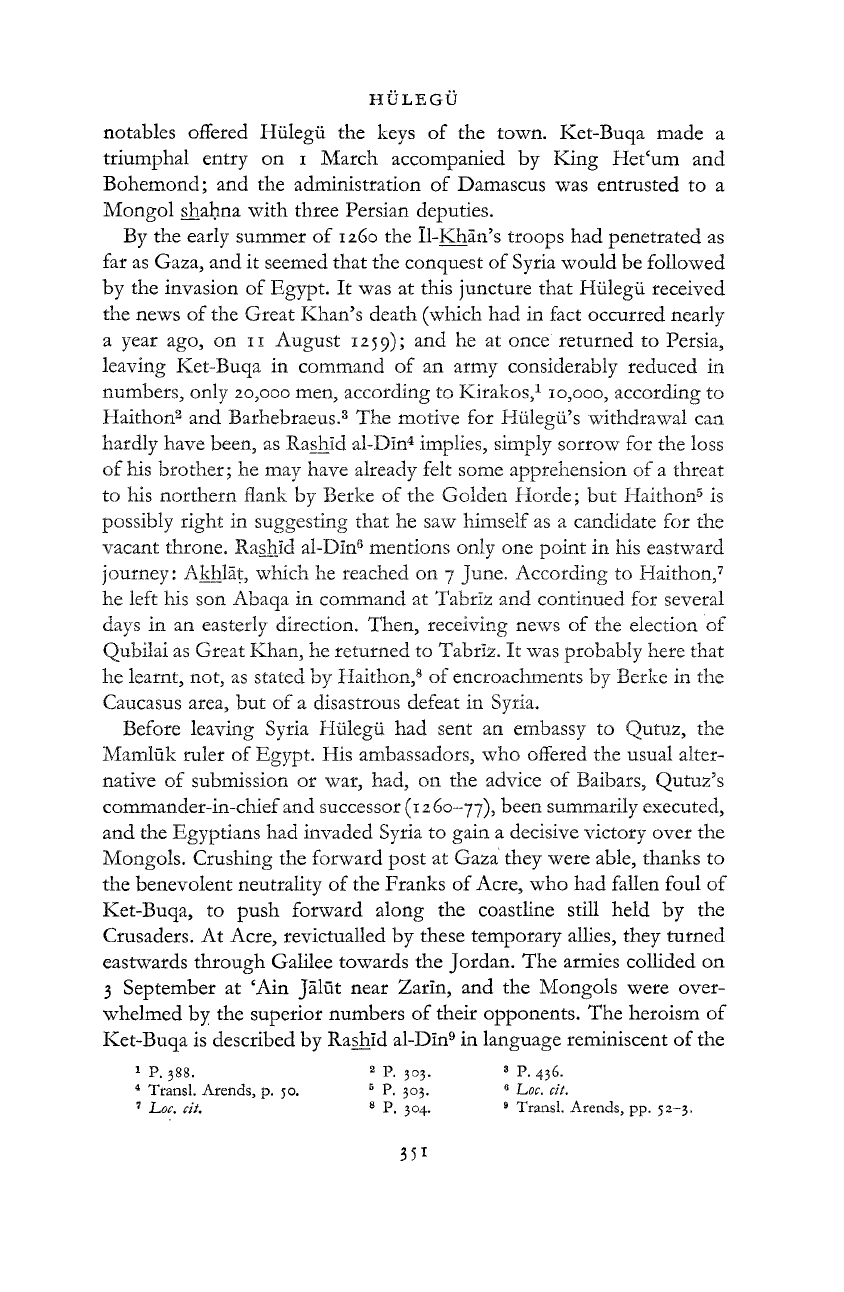
HULEGU
35*
notables offered Hulegii the keys of the town. Ket-Buqa made a
triumphal entry on i March accompanied by King Het'um and
Bohemond; and the administration of Damascus was entrusted to a
Mongol shahna with three Persian deputies.
By the early summer of
1260
the Il-Khan's troops had penetrated as
far as Gaza, and it seemed that the conquest of Syria would be followed
by the invasion of Egypt. It was at this juncture that Hulegii received
the news of the Great Khan's death (which had in fact occurred nearly
a year ago, on
11 August
1259);
and he at once returned to Persia,
leaving Ket-Buqa in command of an army considerably reduced in
numbers, only
20,000 men, according to Kirakos,
1
10,000,
according to
Haithon
2
and Barhebraeus.
3
The motive for Hulegii's withdrawal can
hardly have been, as Rashid al-Dln
4
implies, simply sorrow for the loss
of his brother; he may have already felt some apprehension of a threat
to his northern flank by Berke of the Golden Horde; but Haithon
5
is
possibly right in suggesting that he saw himself as a candidate for the
vacant throne. Rashid
al-Din
6
mentions only one point in his eastward
journey: Akhlat, which he reached on 7 June. According to Haithon,
7
he left his son Abaqa in command at Tabriz and continued for several
days in an easterly direction. Then, receiving news of the election of
Qubilai as Great Khan, he returned to Tabriz. It was probably here that
he learnt, not, as stated by Haithon,
8
of encroachments by Berke in the
Caucasus area, but of a disastrous defeat in Syria.
Before leaving Syria Hulegii had sent an embassy to Qutuz, the
Mamluk ruler of Egypt. His ambassadors, who offered the usual alter-
native of submission or war, had, on the advice of Baibars, Qutuz's
commander-in-chief and successor
(1260-77),
been summarily executed,
and the Egyptians had invaded Syria to gain a decisive victory over the
Mongols. Crushing the forward post at Gaza they were able, thanks to
the benevolent neutrality of the Franks of Acre, who had fallen foul of
Ket-Buqa, to push forward along the coastline still held by the
Crusaders. At Acre, revictualled by these temporary allies, they turned
eastwards through Galilee towards the Jordan. The armies collided on
3 September at 'Ain Jalut near Zarin, and the Mongols were over-
whelmed by the superior numbers of their opponents. The heroism of
Ket-Buqa is described by Rashid al-Din
9
in language reminiscent of the
1
P. 388.
2
P. 303.
3
P. 436.
4
Transl. Arends, p. 50.
5
P. 303.
6
Loc, cit.
7
Loc. cit.
8
P. 304.
9
Transl. Arends, pp. 52-3.
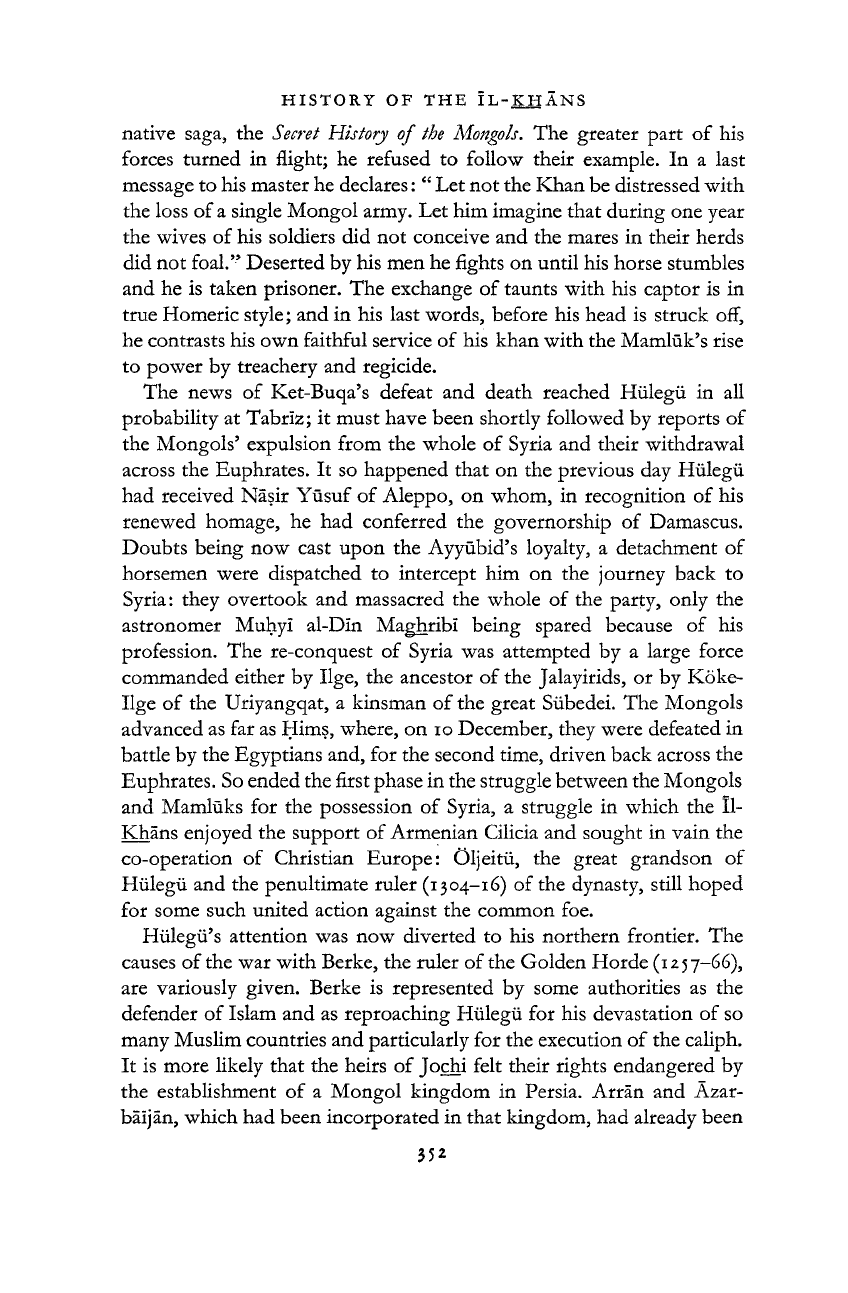
HISTORY OF THE İL-KHÂNS
352
native saga, the Secret History of the
Mongols.
The greater part of his
forces turned in flight; he refused to follow their example. In a last
message to his master he declares: " Let not the Khan be distressed with
the loss of a single Mongol army. Let him imagine that during one year
the wives of his soldiers did not conceive and the mares in their herds
did not foal." Deserted by his men he fights on until his horse stumbles
and he is taken prisoner. The exchange of taunts with his captor is in
true Homeric style; and in his last words, before his head is struck off,
he contrasts his own faithful service of his khan with the
Mamlük's rise
to power by treachery and regicide.
The news of Ket-Buqa's defeat and death reached Hülegü in all
probability at Tabriz; it must have been shortly followed by reports of
the Mongols' expulsion from the whole of Syria and their withdrawal
across the Euphrates. It so happened that on the previous day
Hülegü
had received Naşir Yûsuf of Aleppo, on whom, in recognition of his
renewed homage, he had conferred the governorship of Damascus.
Doubts being now cast upon the
Ayyübid's loyalty, a detachment of
horsemen were dispatched to intercept him on the journey back to
Syria: they overtook and massacred the whole of the party, only the
astronomer Muhyi al-Din Maghribi being spared because of his
profession. The re-conquest of Syria was attempted by a large force
commanded either by Ilge, the ancestor of the Jalayirids, or by
Köke-
Ilge of the Uriyangqat, a kinsman of the great Sübedei. The Mongols
advanced as far as Himş, where, on
10
December, they were defeated in
battle by the Egyptians and, for the second time, driven back across the
Euphrates. So ended the first phase in the struggle between the Mongols
and
Mamlüks for the possession of Syria, a struggle in which the II-
Khâns enjoyed the support of Armenian Cilicia and sought in vain the
co-operation of Christian Europe:
Öljeitü, the great grandson of
Hülegü and the penultimate ruler
(1304-16)
of the dynasty, still hoped
for some such united action against the common foe.
Hülegü's attention was now diverted to his northern frontier. The
causes of the war with Berke, the ruler of the Golden Horde
(1257-66),
are variously given. Berke is represented by some authorities as the
defender of Islam and as reproaching Hülegü for his devastation of so
many Muslim countries and particularly for the execution of the caliph.
It is more likely that the heirs of Jochi felt their rights endangered by
the establishment of a Mongol kingdom in Persia.
Arrân and Âzar-
bâijân,
which had been incorporated in that kingdom, had already been
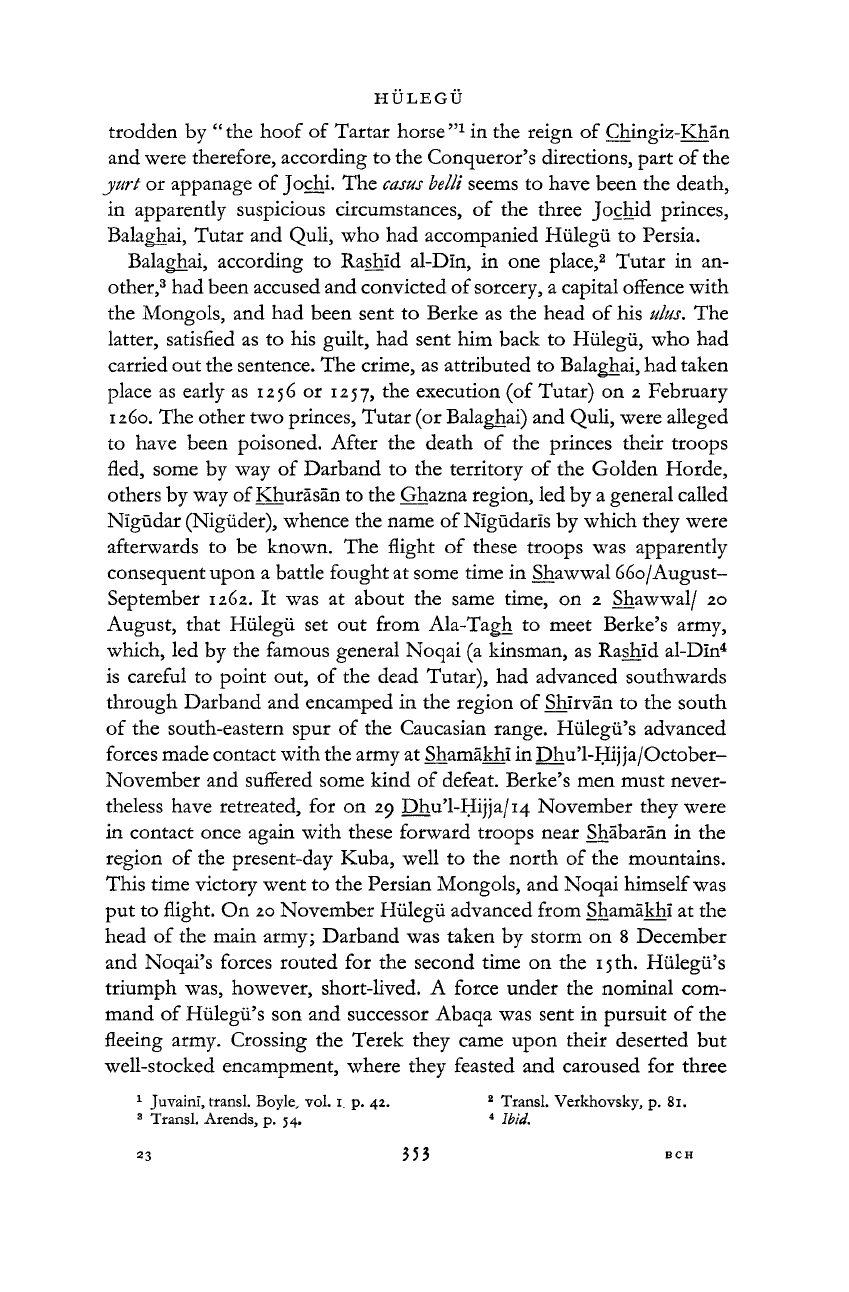
HULEGU
23
353
BCH
trodden by " the hoof of Tartar horse in the reign of Chingiz-Khan
and were therefore, according to the Conqueror's directions, part of the
jurt or appanage of Jochi. The casus belli seems to have been the death,
in apparently suspicious circumstances, of the three Jochid princes,
Balaghai, Tutar and Quli, who had accompanied Hulegii to Persia.
Balaghai, according to Rashid al-Din, in one place,
2
Tutar in an-
other,
3
had been accused and convicted of sorcery, a capital offence with
the Mongols, and had been sent to Berke as the head of his
ulus.
The
latter, satisfied as to his guilt, had sent him back to Hulegii, who had
carried out the sentence. The crime, as attributed to Bala
ghai, had taken
place as early as
1256
or
1257,
the execution (of Tutar) on 2 February
1260.
The other two princes, Tutar (or Balaghai) and Quli, were alleged
to have been poisoned. After the death of the princes their troops
fled, some by way of Darband to the territory of the Golden Horde,
others by way of Khurasan to the Ghazna region, led by a general called
Nigudar (Nigiider), whence the name of Nigudaris by which they were
afterwards to be known. The flight of these troops was apparently
consequent upon a battle fought at some time in Shawwal
660/August-
September
1262.
It was at about the same time, on 2 Shawwal/ 20
August, that Hiilegu. set out from Ala-Tagh to meet Berke's army,
which, led by the famous general Noqai (a kinsman, as Rashid al-Din
4
is careful to point out, of the dead Tutar), had advanced southwards
through Darband and encamped in the region of Shirvan to the south
of the south-eastern spur of the Caucasian range. Hiilegii's advanced
forces made contact with the army at Shamakhi in Dhu'l-Hij ja/October-
November and suffered some kind of defeat. Berke's men must never-
theless have retreated, for on 29
Dhu'l-Hijja/14
November they were
in contact once again with these forward troops near Shabaran in the
region of the present-day Kuba, well to the north of the mountains.
This time victory went to the Persian Mongols, and Noqai himself was
put to flight. On
20
November Hulegii advanced from Shamakhi at the
head of the main army; Darband was taken by storm on 8 December
and Noqai's forces routed for the second time on the
15
th. Hiilegii's
triumph was, however, short-lived. A force under the nominal com-
mand of Hiilegii's son and successor Abaqa was sent in pursuit of the
fleeing army. Crossing the Terek they came upon their deserted but
well-stocked encampment, where they feasted and caroused for three
1
Juvaini,
transl.
Boyle, vol. 1. p. 42.
2
Transl. Verkhovsky, p. 81.
3
Transl. Arends, p. 54.
4
Ibid.
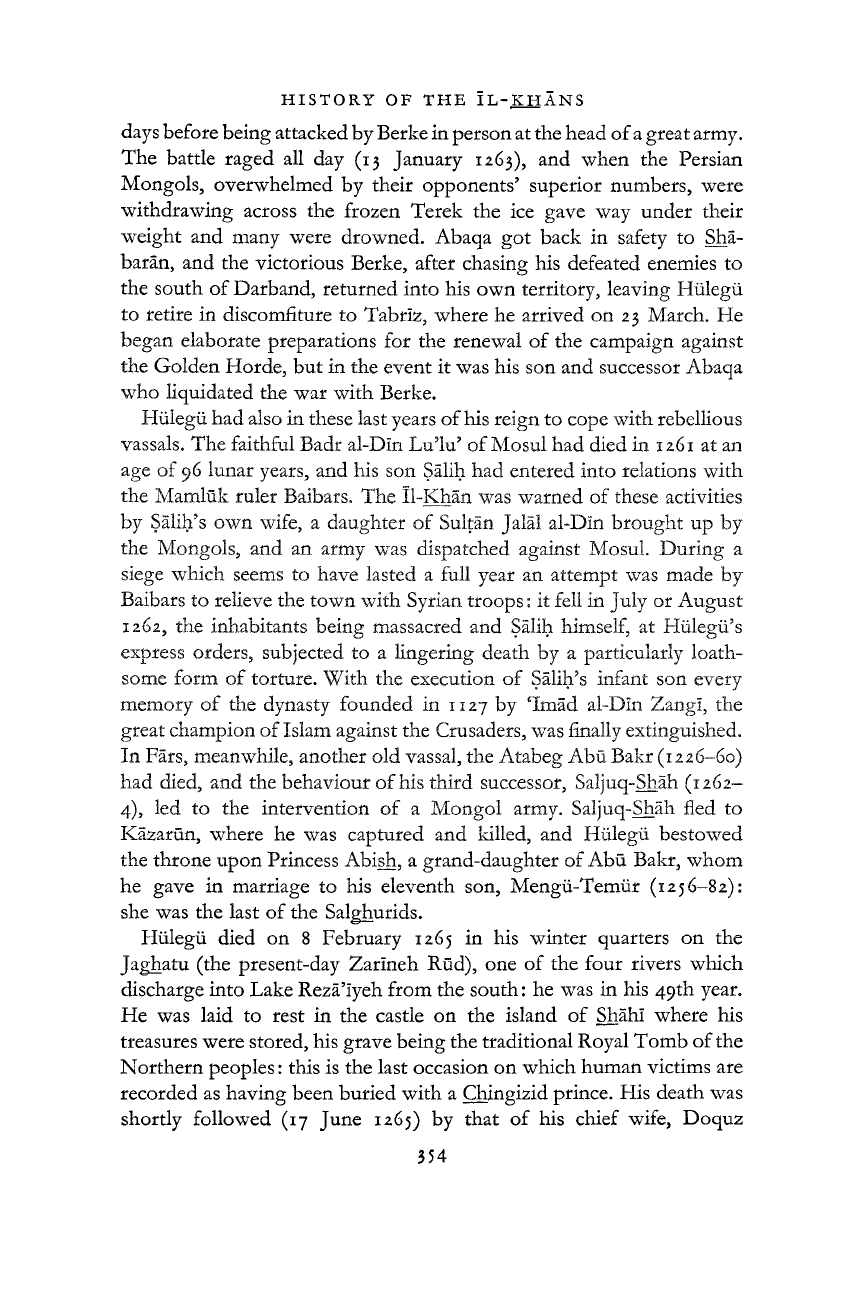
HISTORY OF THE IL-KHANS
354
days before being attacked by Berke in person at the head of a great army.
The battle raged all day
(13 January 1263), and when the Persian
Mongols, overwhelmed by their opponents' superior numbers, were
withdrawing across the frozen Terek the ice gave way under their
weight and many were drowned. Abaqa got back in safety to Sha-
baran, and the victorious Berke, after chasing his defeated enemies to
the south of Darband, returned into his own territory, leaving Hiilegii
to retire in discomfiture to Tabriz, where he arrived on 23 March. He
began elaborate preparations for the renewal of the campaign against
the Golden Horde, but in the event it was his son and successor Abaqa
who liquidated the war with Berke.
Hiilegii had also in these last years of his reign to cope with rebellious
vassals. The faithful Badr al-Din Lulu' of Mosul had died in
1261
at an
age of
96
lunar years, and his son Salih had entered into relations with
the Mamluk ruler Baibars. The Il-Khan was warned of these activities
by Salih's own wife, a daughter of Sultan Jalal al-Din brought up by
the Mongols, and an army was dispatched against Mosul. During a
siege which seems to have lasted a full year an attempt was made by
Baibars to relieve the town with Syrian troops: it fell in July or August
1262,
the inhabitants being massacred and Salih himself, at Hulegii's
express orders, subjected to a lingering death by a particularly loath-
some form of torture. With the execution of Salih's infant son every
memory of the dynasty founded in 1127 by 'Imad al-Din Zangi, the
great champion of Islam against the Crusaders, was finally extinguished.
In Fars, meanwhile, another old vassal, the Atabeg Abu. Bakr
(1226-60)
had died, and the behaviour of his third successor, Saljuq-Shah (1262-
4),
led to the intervention of a Mongol army. Saljuq-Shah fled to
Kazarun, where he was captured and killed, and Hiilegii bestowed
the throne upon Princess Abish, a grand-daughter of Abu. Bakr, whom
he gave in marriage to his eleventh son, Mengu-Temiir
(1256-82):
she was the last of the Salghurids.
Hiilegii died on 8 February 1265 in his winter quarters on the
Jaghatu (the present-day Zarineh Riid), one of the four rivers which
discharge into Lake Reza'iyeh from the south: he was in his
49th
year.
He was laid to rest in the castle on the island of Shahi where his
treasures were stored, his grave being the traditional Royal Tomb of the
Northern peoples: this is the last occasion on which human victims are
recorded as having been buried with a Chingizid prince. His death was
shortly followed (17 June
1265)
by that of his chief wife, Doquz
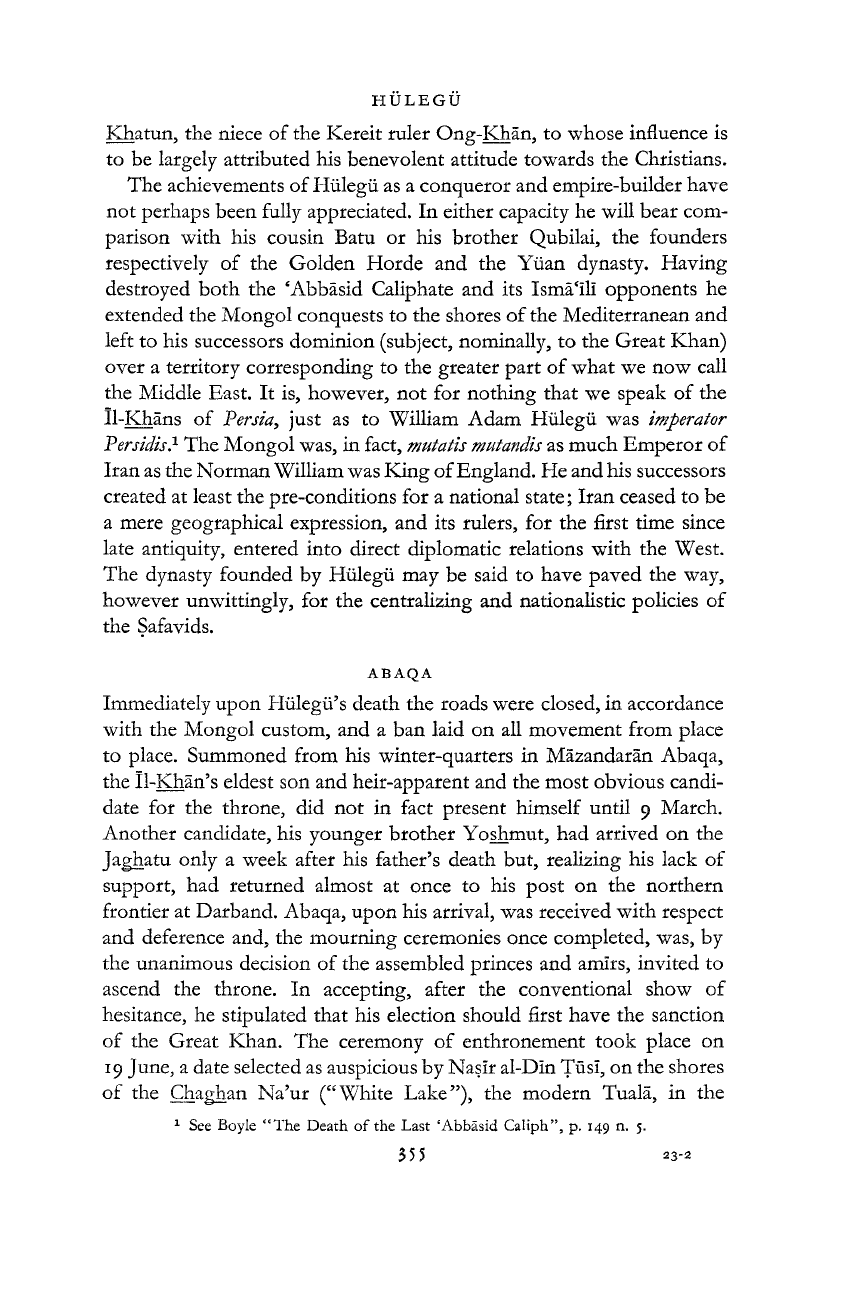
HÜLEGÜ
Khatun, the niece of the Kereit ruler Ong-Khan, to whose influence is
to be largely attributed his benevolent attitude towards the Christians.
The achievements of Hülegü as a conqueror and empire-builder have
not perhaps been fully appreciated. In either capacity he will bear com-
parison with his cousin Batu or his brother Qubilai, the founders
respectively of the Golden Horde and the Yuan dynasty. Having
destroyed both the 'Abbâsid Caliphate and its Ismâ'ill opponents he
extended the Mongol conquests to the shores of the Mediterranean and
left to his successors dominion (subject, nominally, to the Great Khan)
over a territory corresponding to the greater part of what we now call
the Middle East. It is, however, not for nothing that we speak of the
Il-Khâns of Persia, just as to William Adam Hülegü was imperator
Persidis.
1
The Mongol was, in fact, mutatis mutandis as much Emperor of
Iran as the Norman William was King of England. He and his successors
created at least the pre-conditions for a national state; Iran ceased to be
a mere geographical expression, and its rulers, for the first time since
late antiquity, entered into direct diplomatic relations with the West.
The dynasty founded by Hülegü may be said to have paved the way,
however unwittingly, for the centralizing and nationalistic policies of
the Şafavids.
ABAQA
Immediately upon Hülegü's death the roads were closed, in accordance
with the Mongol custom, and a ban laid on all movement from place
to place. Summoned from his winter-quarters in Mâzandarân Abaqa,
the Il-Khân's eldest son and heir-apparent and the most obvious candi-
date for the throne, did not in fact present himself until 9 March.
Another candidate, his younger brother Yoshmut, had arrived on the
Jaghatu only a week after his father's death but, realizing his lack of
support, had returned almost at once to his post on the northern
frontier at Darband. Abaqa, upon his arrival, was received with respect
and deference and, the mourning ceremonies once completed, was, by
the unanimous decision of the assembled princes and amirs, invited to
ascend the throne. In accepting, after the conventional show of
hesitance, he stipulated that his election should first have the sanction
of the Great Khan. The ceremony of enthronement took place on
19
June, a date selected as auspicious by Naşir al-Din Tüsï, on the shores
of the Chaghan Na'ur ("White Lake"), the modern Tualâ, in the
1
See Boyle "The Death of the Last 'Abbâsid Caliph", p. 149 n. 5.
355 23-2
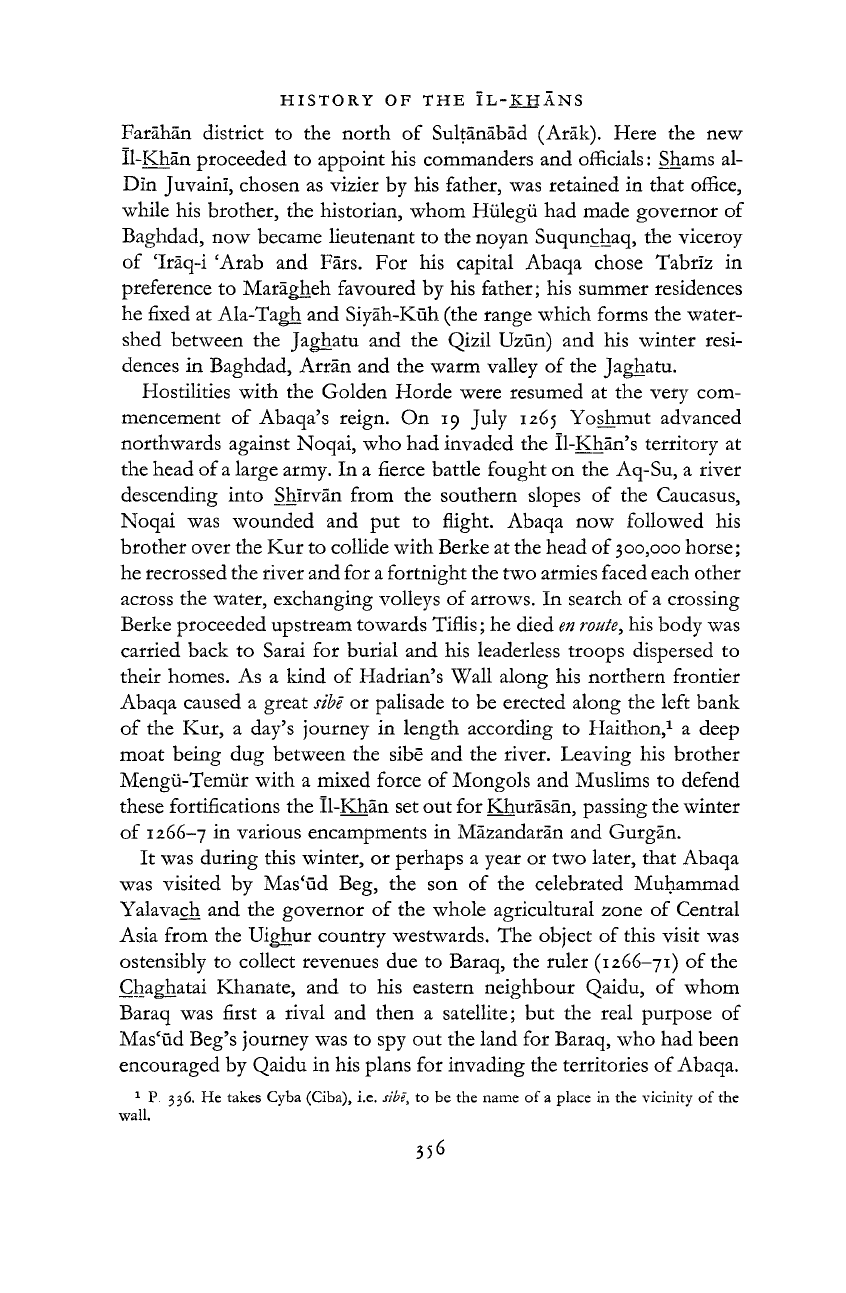
HISTORY OF THE IL-KHANS
356
Farahan district to the north of Sultanabad (Arak). Here the new
Il-Khan proceeded to appoint his commanders and officials:
Shams al-
Din Juvaini, chosen as vizier by his father, was retained in that office,
while his brother, the historian, whom Hulegu had made governor of
Baghdad, now became lieutenant to the noyan Suqunchaq, the viceroy
of 'Iraq-i 'Arab and Fars. For his capital Abaqa chose Tabriz in
preference to Mara
gheh favoured by his father; his summer residences
he fixed at Ala-Ta
gh and Siyah-Kiih (the range which forms the water-
shed between the Jaghatu and the Qizil Uzun) and his winter resi-
dences in Baghdad, Arran and the warm valley of the Ja
ghatu.
Hostilities with the Golden Horde were resumed at the very com-
mencement of Abaqa's reign. On 19 July 1265 Yoshmut advanced
northwards against Noqai, who had invaded the Il-Khan's territory at
the head of a large army. In a fierce battle fought on the Aq-Su, a river
descending into Shirvan from the southern slopes of the Caucasus,
Noqai was wounded and put to flight. Abaqa now followed his
brother over the Kur to collide with Berke at the head of
300,000 horse;
he recrossed the river and for a fortnight the two armies faced each other
across the water, exchanging volleys of arrows. In search of a crossing
Berke proceeded upstream towards Tiflis; he died
en
route,
his body was
carried back to Sarai for burial and his leaderless troops dispersed to
their homes. As a kind of Hadrian's Wall along his northern frontier
Abaqa caused a great sibe or palisade to be erected along the left bank
of the Kur, a day's journey in length according to Haithon,
1
a deep
moat being dug between the sibe and the river. Leaving his brother
Mengii-Temur with a mixed force of Mongols and Muslims to defend
these fortifications the Il-Khan set out for Khurasan, passing the winter
of
1266-7 in various encampments in Mazandaran and Gurgan.
It was during this winter, or perhaps a year or two later, that Abaqa
was visited by Mas'ud Beg, the son of the celebrated Muhammad
Yalavach and the governor of the whole agricultural zone of Central
Asia from the Ui
ghur country westwards. The object of this visit was
ostensibly to collect revenues due to Baraq, the ruler
(1266-71)
of the
Cha
ghatai Khanate, and to his eastern neighbour Qaidu, of whom
Baraq was first a rival and then a satellite; but the real purpose of
Mas'ud Beg's journey was to spy out the land for Baraq, who had been
encouraged by Qaidu in his plans for invading the territories of Abaqa.
1
P. 336. He takes Cyba (Ciba), i.e. sibe, to be the name of
a
place in the vicinity of the
wall.
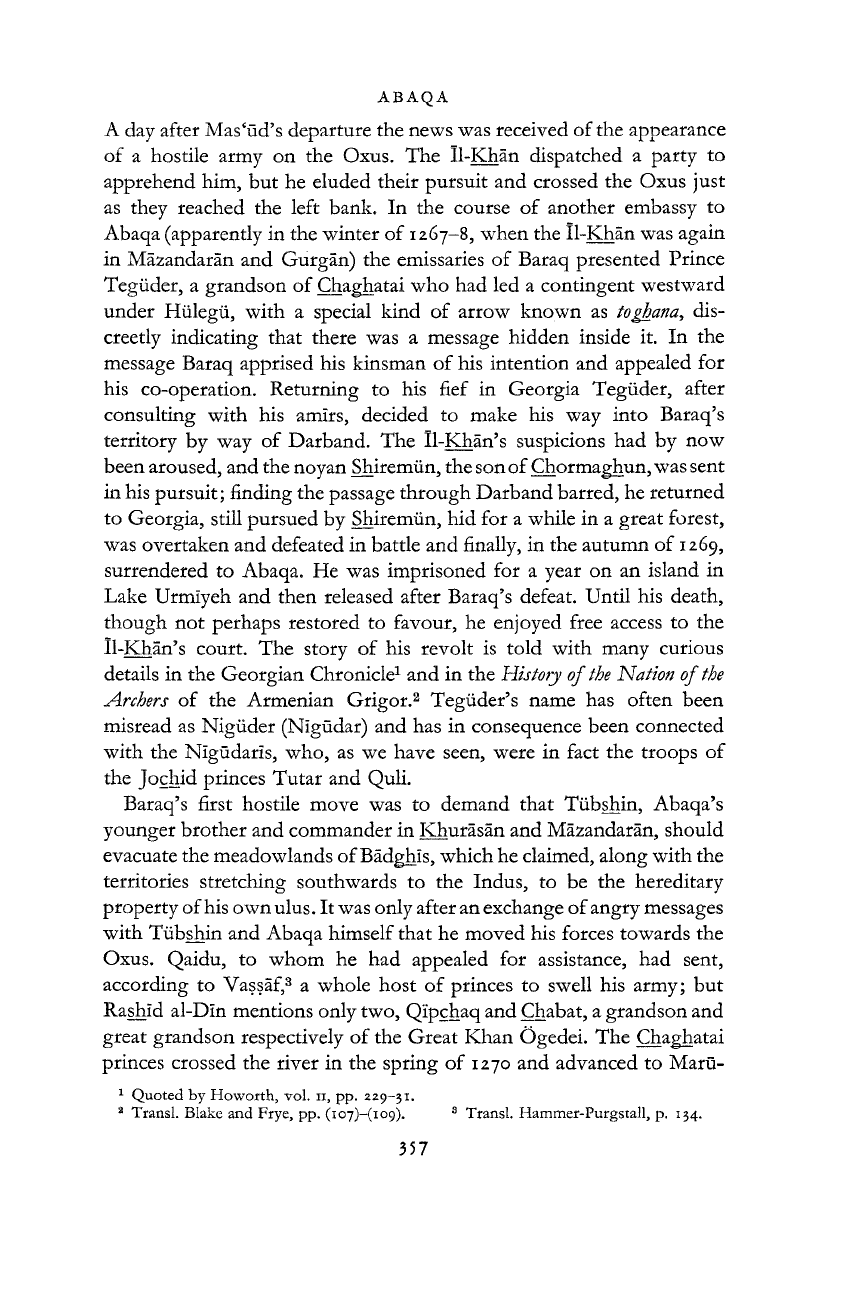
ABAQA
357
A day after Mas'ud's departure the news was received of the appearance
of a hostile army on the Oxus. The Il-Khan dispatched a party to
apprehend him, but he eluded their pursuit and crossed the Oxus just
as they reached the left bank. In the course of another embassy to
Abaqa (apparently in the winter of
1267-8, when the Il-Khan was again
in Mazandaran and Gurgan) the emissaries of Baraq presented Prince
Tegiider, a grandson of Cha
ghatai who had led a contingent westward
under Hiilegu, with a special kind of arrow known as toghana, dis-
creetly indicating that there was a message hidden inside it. In the
message Baraq apprised his kinsman of his intention and appealed for
his co-operation. Returning to his fief in Georgia Tegiider, after
consulting with his amirs, decided to make his way into Baraq's
territory by way of Darband. The Il-Khan's suspicions had by now
been aroused, and the noyan Shiremiin, the son of Chormaghun, was sent
in his pursuit; finding the passage through Darband barred, he returned
to Georgia, still pursued by Shiremiin, hid for a while in a great forest,
was overtaken and defeated in battle and finally, in the autumn of
1269,
surrendered to Abaqa. He was imprisoned for a year on an island in
Lake Urmiyeh and then released after Baraq's defeat. Until his death,
though not perhaps restored to favour, he enjoyed free access to the
Il-Khan's court. The story of his revolt is told with many curious
details in the Georgian Chronicle
1
and in the History of
the
Nation of
the
Archers of the Armenian Grigor.
2
Tegiider's name has often been
misread as Nigiider (Nigudar) and has in consequence been connected
with the Nigudaris, who, as we have seen, were in fact the troops of
the Jochid princes Tutar and Quli.
Baraq's first hostile move was to demand that Tubshin, Abaqa's
younger brother and commander in
Khurasan and Mazandaran, should
evacuate the meadowlands of Badghis, which he claimed, along with the
territories stretching southwards to the Indus, to be the hereditary
property of his own ulus. It was only after an exchange of angry messages
with Tubshin and Abaqa himself that he moved his forces towards the
Oxus. Qaidu, to whom he had appealed for assistance, had sent,
according to
Vassaf,
3
a whole host of princes to swell his army; but
Rashid al-Din mentions only two, Qipchaq and Chabat, a grandson and
great grandson respectively of the Great Khan Ogedei. The Cha
ghatai
princes crossed the river in the spring of
1270
and advanced to Marii-
1
Quoted
by
Howorth,
vol. 11, pp. 229-31.
2
Transl.
Blake
and Frye, pp.
(IO7)-(IO9).
3
Transl.
Hammer-Purgstall,
p. 134.
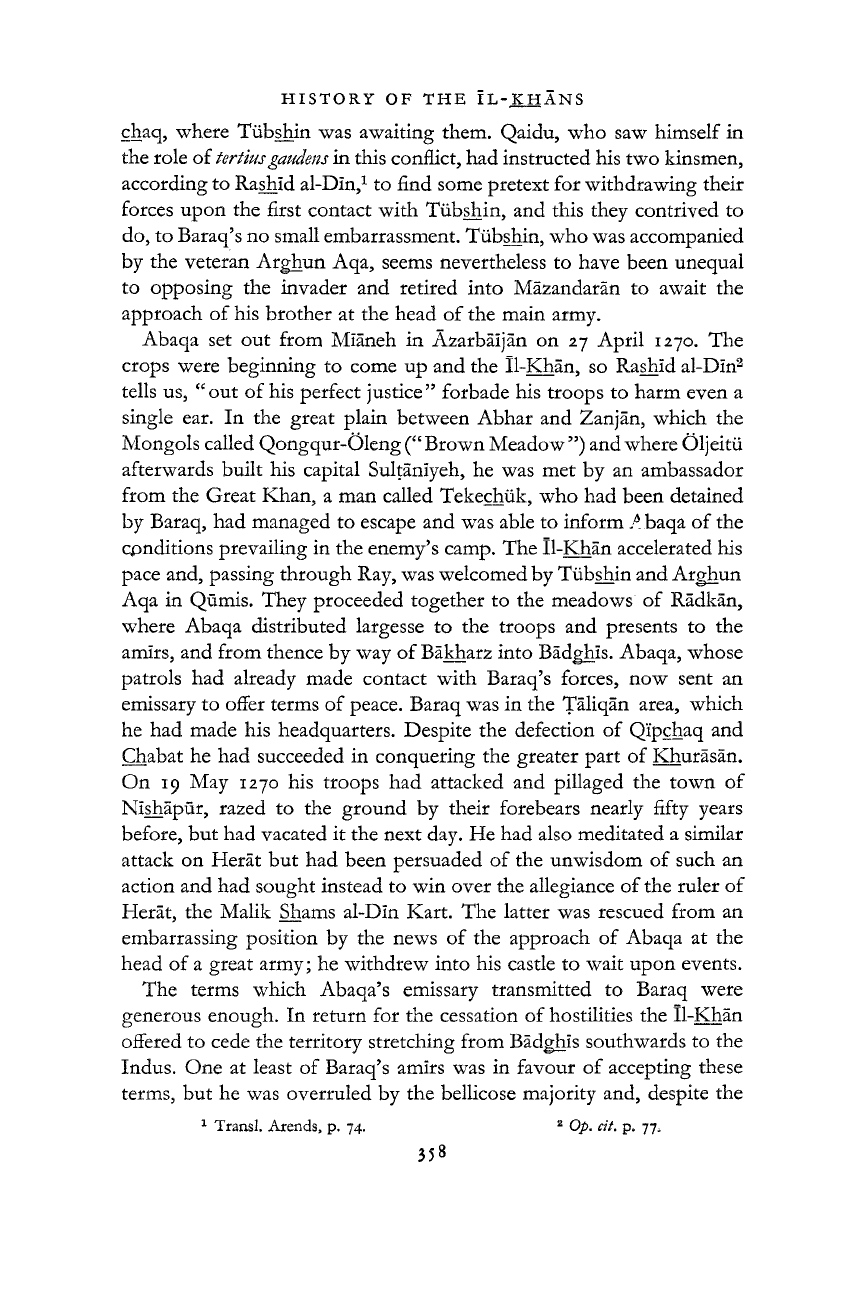
HISTORY OF THE IL-KHANS
358
chaq, where Tiibshin was awaiting them. Qaidu, who saw himself in
the role of tertiusgaudens in this conflict, had instructed his two kinsmen,
according to Rashid al-Din,
1
to find some pretext for withdrawing their
forces upon the first contact with Tiibshin, and this they contrived to
do,
to Baraq's no small embarrassment. Tiibshin, who was accompanied
by the veteran Arghun Aqa, seems nevertheless to have been unequal
to opposing the invader and retired into Mazandaran to await the
approach of his brother at the head of the main army.
Abaqa set out from Mianeh in Azarbaijan on 27 April
1270.
The
crops were beginning to come up and the Il-Khan, so Rashid al-Din
2
tells us, "out of his perfect justice" forbade his troops to harm even a
single ear. In the great plain between Abhar and Zanjan, which the
Mongols called Qongqur-Oleng (" Brown Meadow ") and where Oljeitii
afterwards built his capital Sultaniyeh, he was met by an ambassador
from the Great Khan, a man called Tekechiik, who had been detained
by Baraq, had managed to escape and was able to inform Abaqa of the
conditions prevailing in the enemy's camp. The Il-Khan accelerated his
pace and, passing through Ray, was welcomed by Tiibshin and Arghun
Aqa in Qiimis. They proceeded together to the meadows of Radkan,
where Abaqa distributed largesse to the troops and presents to the
amirs, and from thence by way of Bakharz into Badghis. Abaqa, whose
patrols had already made contact with Baraq's forces, now sent an
emissary to offer terms of peace. Baraq was in the Taliqan area, which
he had made his headquarters. Despite the defection of Qipchaq and
Chabat he had succeeded in conquering the greater part of Khurasan.
On 19 May
1270
his troops had attacked and pillaged the town of
Nishapiir, razed to the ground by their forebears nearly fifty years
before,
but had vacated it the next day. He had also meditated a similar
attack on Herat but had been persuaded of the unwisdom of such an
action and had sought instead to win over the allegiance of the ruler of
Herat, the Malik Shams al-Din Kart. The latter was rescued from an
embarrassing position by the news of the approach of Abaqa at the
head of a great army; he withdrew into his castle to wait upon events.
The terms which Abaqa's emissary transmitted to Baraq were
generous enough. In return for the cessation of hostilities the Il-Khan
offered to cede the territory stretching from Badghis southwards to the
Indus. One at least of Baraq's amirs was in favour of accepting these
terms, but he was overruled by the bellicose majority and, despite the
1
Transl. Arends, p. 74.
2
Op. cit. p. 77^
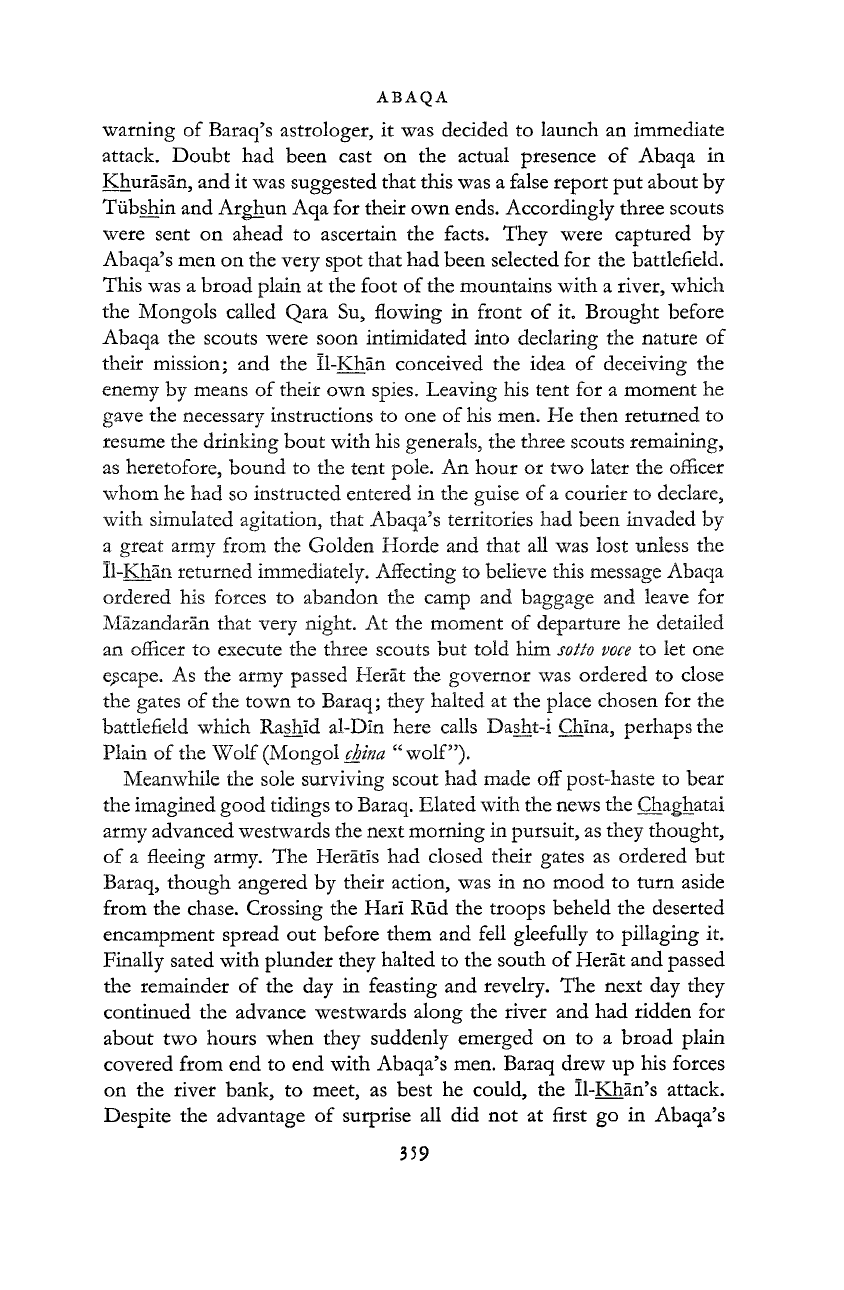
ABAQA
359
warning of Baraq's astrologer, it was decided to launch an immediate
attack. Doubt had been cast on the actual presence of Abaqa in
Khurasan, and it was suggested that this was a false report put about by
Tubshin and A
rghun Aqa for their own ends. Accordingly three scouts
were sent on ahead to ascertain the facts. They were captured by
Abaqa's men on the very spot that had been selected for the battlefield.
This was a broad plain at the foot of the mountains with a river, which
the Mongols called Qara Su, flowing in front of it. Brought before
Abaqa the scouts were soon intimidated into declaring the nature of
their mission; and the Il-Khan conceived the idea of deceiving the
enemy by means of their own spies. Leaving his tent for a moment he
gave the necessary instructions to one of his men. He then returned to
resume the drinking bout with his generals, the three scouts remaining,
as heretofore, bound to the tent pole. An hour or two later the officer
whom he had so instructed entered in the guise of a courier to declare,
with simulated agitation, that Abaqa's territories had been invaded by
a great army from the Golden Horde and that all was lost unless the
Il-Khan returned immediately. Affecting to believe this message Abaqa
ordered his forces to abandon the camp and baggage and leave for
Mazandaran that very night. At the moment of departure he detailed
an officer to execute the three scouts but told him sotto
voce
to let one
escape.
As the army passed Herat the governor was ordered to close
the gates of the town to Baraq; they halted at the place chosen for the
battlefield which Rashid al-Din here calls Dasht-i China, perhaps the
Plain of the Wolf (Mongol china "wolf").
Meanwhile the sole surviving scout had made off post-haste to bear
the imagined good tidings to Baraq. Elated with the news the Chaghatai
army advanced westwards the next morning in pursuit, as they thought,
of a fleeing army. The Heratis had closed their gates as ordered but
Baraq, though angered by their action, was in no mood to turn aside
from the chase. Crossing the Hari Rud the troops beheld the deserted
encampment spread out before them and fell gleefully to pillaging it.
Finally sated with plunder they halted to the south of Herat and passed
the remainder of the day in feasting and revelry. The next day they
continued the advance westwards along the river and had ridden for
about two hours when they suddenly emerged on to a broad plain
covered from end to end with Abaqa's men. Baraq drew up his forces
on the river bank, to meet, as best he could, the Il-Khan's attack.
Despite the advantage of surprise all did not at first go in Abaqa's
